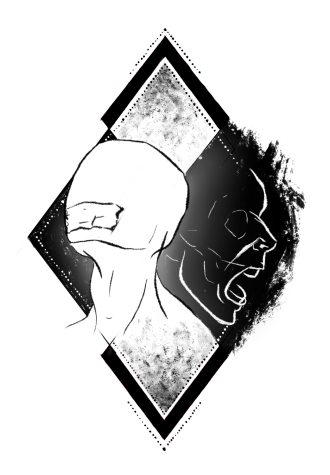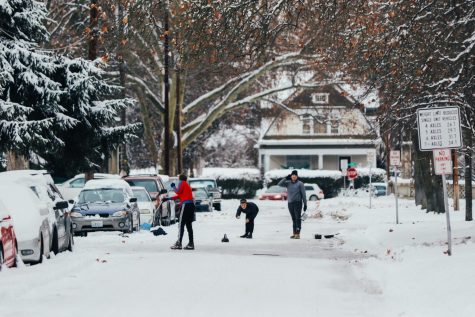From doping to genocide: A look at the Beijing Winter Olympics
March 3, 2022
Though political controversy is nothing new to the Olympic Games, the 2022 Winter Olympics in Beijing, China have proven contentious. From the dismissal of the ongoing Uyghur genocide to the International Olympic Committee’s differing treatment of doping cases, the Olympics have generated considerable debate.
In Xinjiang, China, the motivations of the Chinese Communist Party (CCP) have been questioned as an attempted cultural genocide of the Uyghur people, a Turkic Muslim minority.
The CCP has been accused of attempting to “sportwash” their treatment of the Uyghur people by selecting Dinigeer Yilamujiang, a cross country skier of Uyghur descent, to light the Olympic cauldron. Sportwashing is a newly coined term meant to refer to an instance when an individual, group, corporation or nation-state uses sports to improve its reputation and public image.
The mass detention of the Uyghur people began in 2016 as part of the CCP’s plan for “reeducation” to create a more productive population.
The Chinese state has limited the use of the Uyghur language, enacted legal restrictions on religious practice, destroyed mosques and other religious sites, implemented financial incentives to encourage intermarriage with the dominant Han ethnic group and persecuted highly educated Uyghur people of cultural and political influence.
Through satellite imagery and drone footage, the China Undercover documentary revealed the presence of large prison-like structures and significant numbers of shackled prisoners in Xinjiang. Experts cited in the documentary have described the CCP’s acts as the largest mass incarceration of an ethnic group since the Holocaust.
The CCP has claimed the camps are “vocational education and training centers” but classified government documents obtained by the International Consortium of Investigative Journalists depicted these facilities as involuntary indoctrination centers, with high watchtowers, constant camera surveillance, harsh punishments and dedicated police bases to prevent escapes.
Many Uyghur people living abroad have become increasingly concerned by the sudden loss of contact with their relatives currently residing in China.
According to the UN Convention on the Prevention and Punishment of the Crime of Genocide, the CCP’s actions meet and exceed the criteria for genocide. The title of genocide is recognized by the governments of the United States, Canada, the Netherlands, United Kingdom and France.
In response to China’s apparent violation of human rights, the United States, Canada, United Kingdom and Australia announced diplomatic boycotts of the 2022 Beijing Olympics. The diplomatic boycott barred all government officials from attending the games in an official capacity.
Amid other controversies sparked at the Games is the Committee’s variable response to doping cases. In summer of 2021, American track and field sprinter Sha’carri Richardson won the 100-meter race in the U.S. Olympic trials. After she tested positive for THC, an intoxicant originating from marijuana, she was denied participation in the Tokyo Summer Olympics.
The runner told NBC News that she had used marijuana to cope with the death of her mother a week before the qualifier.
“I greatly apologize if I let you guys down—and I did. This will be the last time the US comes home without a gold in the 100m,” Richardson said.
This February, fifteen-year-old Russian figure skater Kamila Valieva was cleared to compete in the women’s figure skating signature event. After test results from December revealed Valieva tested positive for three substances sometimes used to help the heart, Olympic officials said they planned to withhold medals. In any event in which Valieva placed in the top three, no decisions will be made until after her doping case is resolved.
Only one of the three substances found in Valieva’s system is banned, but trimetazidine is well known by the World Anti-Doping Agency, as it can increase blood flow efficiency and improve endurance.
The arbitration panel charged with determining the sports ruling of Valieva questioned the timing of the events, acknowledging the six-week delay between the submission of Valieva’s sample and the return of the positive result nearly four days into the Games, after she had finished her first event.
Richardson challenged the panel’s decision on Valieva on Twitter, claiming the disparity between her and Valieva’s treatment was racially motivated.
“Can we get a solid answer on the difference of her situation and mines? My mother died and I can’t run and was also favored to place top 3. The only difference I see is I’m a black young lady,” said Richardson. “It’s all in the skin.”
However, Richardson’s accusations are complicated by Valieva’s age. An athlete younger than sixteen is classified as a protected person under Article 13.3.6 of the International Olympic Committee’s Anti-Doping Rules and is sheltered from potential disqualification.
Concluding the 2022 Winter Olympics, NBC’s Winter Olympics coverage in China drew the smallest TV audience in its history, dropping more than 40 percent since the last Winter Games. This marks the smallest primetime audience for any Winter Olympic Games on record.






